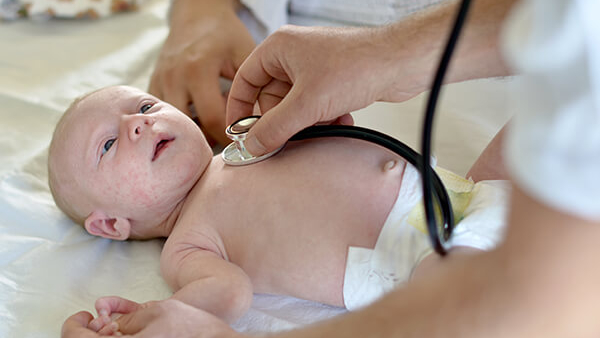What do you do at the maternity ward?
Breastfeed/bottle-feed, sleep, change diapers … How and what do you actually do when the baby is born?
Read time: 3 m
Verified by Jenny Jansson
Certified midwife
After giving birth, you'll be taken to the maternity ward. In the ward, you'll have the opportunity to get to know your new family member in peace and quiet. The length of stay in the maternity ward varies. Some go home as soon as six hours after giving birth if everything has gone well and the baby is healthy. It's common to return for a follow-up visit a couple of days later for check-ups and a hearing test. Others find it quite nice to stay and receive help with breastfeeding and other aspects related to the baby.
The time spent in the maternity ward is crucial for establishing the first connection between you and your child. You won't need to think about anything else other than getting to know your little baby; the staff takes care of the practicalities and provides you with encouragement and support. In the maternity ward, you can ask questions about anything related to you and your newborn. If for some reason you can't or don't want to breastfeed, it's important to receive understanding for that even at the maternity ward. Your partner plays an important role here; if you're unable or too tired to explain, they should be attentive and speak on your behalf. If the delivery involved vacuum extraction or a cesarean section, it's common for you to meet with a doctor in the maternity ward. You might also meet a physiotherapist or counselor if needed.
Some maternity wards only allow visits from partners and siblings, to provide you with peace and quiet and allow you to focus on the new family member. This is also to prevent outsiders from entering the ward, especially during flu seasons, as there's a risk of infection to the newborns. It varies whether partners are allowed to stay overnight in the maternity ward, but most hospitals allow partners to spend the first night there, even if you're giving birth for the second time. It's a good idea to check the policies at the place where you've chosen to give birth before the delivery; it makes planning easier – especially if there are siblings involved. There are no guarantees of getting a private room as the ward might be full.
Before you can go home, the baby undergoes a comprehensive examination by a pediatrician. During the examination, the baby's lungs, heart, and hip joints among other things are checked. As a parent, it might be uncomfortable to watch the examination, but it doesn't cause any pain to the baby.
Verified by Jenny Jansson
Certified midwife
Hundreds of related articles, podcasts & more waiting for you in the Preggers app.
Download Preggers today.

